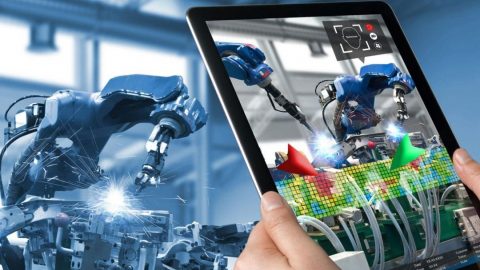
Illustration (Source: Internet)
Digital manufacturing is a production process that uses digital technology to improve production efficiency, including improving the quality of products, services and related supply operations. Nowaday, many countries are strategically pursuing digital manufacturing policies – from Industrie 4.0 in Germany, “Made in China 2025” movement to “Smart Manufacturing” from the USA’s National Institute of Standards and Technology.
In this article, the author will point out five typical businesses that have applied digital manufacturing and have achieved success through it.
1) Adidas Speedfactory
Speedfactory has used digital technology to drastically cut shoe design time for athletes. By using this technology, the company can check the specifications and simulate all the features of the product, as well as predict the errors that may occur before the physical production.
Highly automated machines on the factory floor – such as industrial 3D printers – take care of most of the manufacturing processes at the Speedfactory. This system ensures that the production line can be quickly converted to different design models.
2) Bosch and the IioT
By embedding sensors to machines and analysing their data in real time, engineers have been able to predict faults. This has enabled them to prevent unplanned downtime by fixing problems before they occur. Bosch reports that this approach has increased output by more than 10 per cent in some areas of the factory, while also improving delivery and customer satisfaction.
Over the past four years, engineering and technology company Bosch has made more than €1.5bn with Industry 4.0 applications. By 2022, the organisation wants to raise this figure to €1bn annually.
3) Tata Steel and Analytics
Digital Analytics technique of Tata Steel is applied to optimise yields from raw materials, improve logistics between the various manufacturing processes, and increase the overall quality of the finished product. In addition, Tata also instituted an Advanced Analytics Academy for its employees, helping them to find solutions to waste reduction, and quality and reliability improvements.
4) General Electric and AR
One important emerging technology in the digital factory is Augmented Reality (AR), which can improve manufacturing in a variety of different ways. Employees can interact with complex machinery in the virtual world for training purposes, enabling them to learn without interrupting factory operations. AR headsets also give factory workers access to additional visualised information, such as machinery performance statistics, product assembly guidance and sites of potential malfunction.
General Electric Aviation recently piloted AR glasses to help engineers manufacture jet engines. Through the feedback specifications immediately, engineers can check whether the joints and screws are tightened properly. According to the report, the mechanical efficiency of the production process increased from 8 to 11% thanks to this application. On the other hand, AR glass has also become a quality control tool and ensures effective safety standards.
5) Tesla and intelligent automation
With intelligent automation, you might expect to see a lot of robots, and that is exactly what Tesla’s factory in Freemont, California, delivers. With an area of 5.4 million square feet with more than 200 robots of all kinds, Tesla can ensure processes such as welding, assembly and painting are carried out smoothly although without interference of human.
Although digital manufacturing can be expressed in many different forms, their ultimate goal still is improved productivity, reduce costs and reduce error rates. The applications of digital manufacturing will become the inevitable trend of manufacturers while digital technology is gradually proving its role in all areas of industrial production.